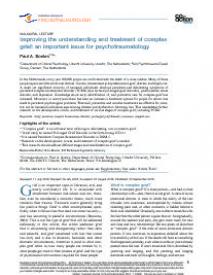Improving the understanding and treatment of complex grief: an important issue for psychotraumatology
In the Netherlands, every year 500,000 people are confronted with the death of a close relative. Many of these people experience little emotional distress. In some, bereavement precipitates severe grief, distress, and dysphoria.
A small yet significant minority of bereaved individuals develops persistent and debilitating symptoms of persistent complex bereavement disorder (PCBD) (also termed prolonged grief disorder), posttraumatic stress disorder, and depression.
Knowledge about early identification of, and preventive care for complex grief has increased.
Moreover, in recent years there has been an increase in treatment options for people for whom loss leads to persistent psychological problems.
That said, preventive and curative treatments are effective for some, but not all bereaved individuals experiencing distress and dysfunction following loss. This necessitates further research on the development, course, and treatment of various stages of complex grief, including PCBD.
In: European journal of psychotraumatology, ISSN 2000-8066 | 7 | september | 32609
http://dx.doi.org/10.3402/ejpt.v7.32609


